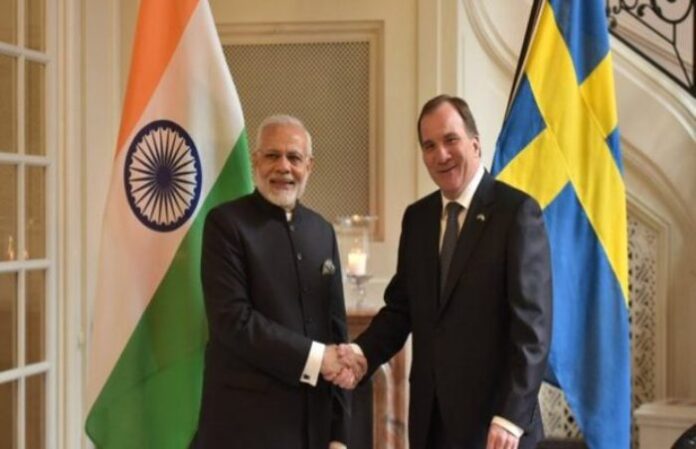– Automation, digitisation & sustainability in the sector discussed –
– Sustainable mining is an area with potential for deepened cooperation between Sweden and India –
New Delhi, May 26, 2022: The Embassy of Sweden, Business Sweden, Invest India and CII jointly organised the first India-Sweden Mining Day today and formally inaugurated the India-Sweden Mining Platform with focused roundtable discussions on some of the critical aspects in the mining sector. The launch took place at the Ambassador’s Residence.
During the recent Indo-Nordic Summit, the Prime Ministers of Sweden and India in their bilateral meeting, mentioned sustainable mining is an area with potential for deepened cooperation between the two countries.
The event was divided into three sessions. Speeches by Ambassador of Sweden to India, Mr Klas Molin, Mr Emil Högberg, State Secretary to Swedish Minister for Business, Industry & Innovation, Dr Veena Kumari, Joint Secretary – Ministry of Mines and Ms Cecilia Oskarsson, Swedish Trade & Investment Commissioner. The next two sessions were panel discussions –on Automation & Digitisation in the Mining Sector and Sustainability in the Mining Sector – Challenges and Opportunities. Experts on the panel were representatives from Swedish mining companies present in India like Sandvik, Epiroc, Volvo, ABB, SKF among others and Indian majors like Tata Steel, Hindustan Zinc etc.
Mr. Klas Molin, Ambassador of Sweden to India, said:
“Sustainability and Innovation lie at the core of our bilateral cooperation, which reinforces a shared commitment to combat climate change and achieve sustainable development also through innovation. Therefore, we are delighted to launch the India-Sweden Mining Platform for a greener, cleaner future of mining. Sweden and India are leading mining nations, and we can learn a lot from each other by sharing solutions and best practices in this field – particularly in areas of automation, digitisation and sustainability.”
State Secretary Hogberg drew attention to the fact that the world is facing a transition from fossil- based energy solutions to new fossil-independent and, often mineral or metal-based, solutions. He further called it a timely event since sustainable mining was one of the areas of cooperation identified by Prime Minister Modi and Prime Minister Andersson during their recent bilateral meeting during the Indo-Nordic Summit.
Indeed, Sweden and India have developed a win-win blueprint for cooperation, especially for innovative solutions, and there is much potential in sustainable mining as a natural next step.
Some relevant facts about Swedish Mining:
• The mining industry will play an important role in supplying the raw materials needed for this transition. At the same time – we need to ensure that the needed mining and recycling is carried out in a sustainable manner. Responsible and sustainable production of metals and minerals is decisive for realising the UN’s global sustainability goals.
• Sweden aims to be the world’s first fossil free welfare state and Sweden’s emissions are to be reduced to net zero within 25 years, by 2045 at the latest. The move to a fossil free state will require increased digitalisation, electrification and automation for reduced emissions and increased efficiency.
• Sweden is a leading mining nation in Europe with a long history and in 2020 we produced 93 % of all iron ore, 34 % of all zinc, 33 % of all lead, 19 % of all gold and 11 % of all copper within the EU.
• Sweden has a strong collaboration between mining companies, technology equipment companies and academia and research institutes. The Swedish mining cluster account for approximately 8% of Sweden’s export and the climate benefit generated by Swedish exports of metals from the mining industry is estimated at about 5.6 million tonnes of CO2 per year.
• Sweden and the other Nordic countries have access to most of the metals used in new technologies. We have the potential to mine these sustainably, and we have a strong tradition of standing up internationally for sustainability and human rights.
• The Swedish government has taken several measures that can benefit the Swedish mineral industry and the industry’s transition to a fossil-free society, but the mining cluster’s own initiatives are just as important. The Swedish mining and mineral industry invest heavily in R&D and is at the forefront of technological development globally. During the last 5 years around 3,5 billion Swedish kronor was invested in R&D.
• The Swedish mining company LKAB is developing technology and circular business models to extract critical raw materials from their waste streams. By recovering and upgrading mine waste the ReeMAP project could produce up to 5 times Sweden’s need of phosphorus fertilisers and 30 percent of EU’s present need of Rare Earth Elements. LKAB and another leading Swedish mining company, Boliden, will work together to investigate the possibility of extracting pyrite concentrate from mining waste at the Boliden Aitik mine, which LKAB will process into fossil-free sulphuric acid. The sulphuric acid will then be used in processes for extracting rare earth elements and phosphorus from LKAB’s mining waste.
• The mine of the future is carbon-dioxide-free, digitalized and autonomous. LKAB has in June 2018 initiated an industrial development project together with ABB, Epiroc, Combitech and Sandvik with the aim of setting a new world standard for mining at great depths. Reaching the goals in this project will demand a new type of collaboration, a digital ecosystem in which the
partners’ digital systems and operations are linked. The project includes a testbed and virtual mine to develop and test new technology.
• Boliden wants to set a standard for the mining and metals industry to pioneer for low-carbon metals. The initiative “Green copper now” offers low carbon and recycled copper products, produced with drastically lower carbon footprint than the global average.
• As part of an ongoing sustainability commitment, Epiroc will remove old batteries from site and replace them with new. These older batteries are then used for secondary applications and will be recycled at the end of the process. The world’s first Batteries as a Service (BaaS) agreement was finalized in 2020.
• Hydrogen Breakthrough Ironmaking Technology (HYBRIT) is a
collaboration between SSAB, LKAB and Vattenfall to jointly
develop the world’s first fossil free steel. The joint venture aims to develop fossil-free process for steel making by 2035, setting a new world standard.
• It is exciting to see the significant opportunities in India. Developing a sustainable Indian mining sector is a stated objective in the National Mineral Policy of 2019. Initiatives like Make in India and investments in smart cities, rural electrification and renewable energy make sustainable mining practices even more important. We are two countries with a common focus and potential for significant mutual benefit.
Corporate Comm India (CCI Newswire)





























